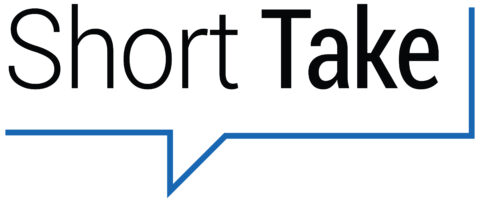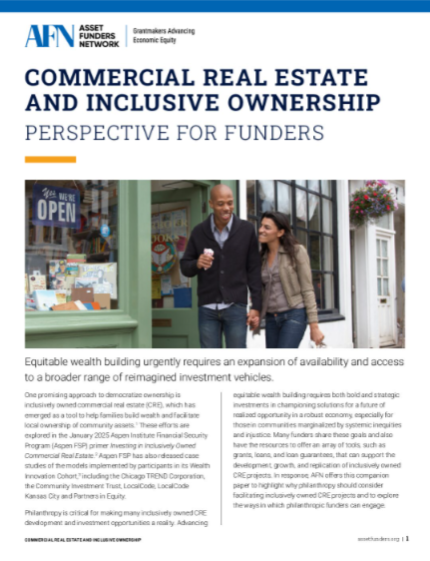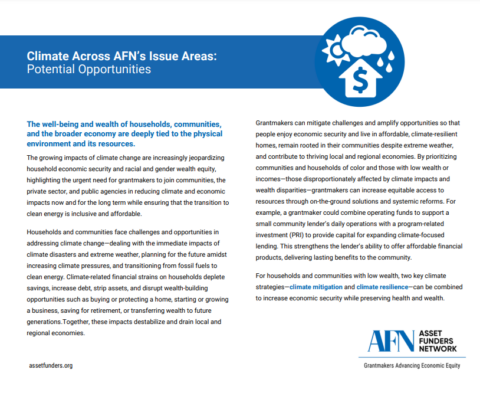
FROM THE PRESIDENT AND CEO
June 2024
Homeownership, since the 1940s, has been a driver of economic security and wealth in the United States. However, systemic barriers have intentionally and historically excluded far too many Americans of color. Despite the absence of any compelling reason for this wealth building to not be available to all, these obstacles persist, hindering our shared goal of equitable economic justice.
In an environment characterized by high interest rates, insufficient housing stock, and unaffordable home prices, the legacy of redlining continues to depress mortgage availability for Americans of color. This raises a critical question for asset-building funders: how can we retain the wealth-building benefits of homeownership while reinventing the market to ensure broader accessibility and sustainability for Black, Latinx, Asian, Southwest Asian and North African, and Indigenous persons in our urban and rural communities?
AFN Members’ Initiatives and Motivations
As AFN members actively explore how their decisions, investments, grants, and gifts can advance economic justice, it is clear that addressing barriers to homeownership transcends mere economic policy. Funders are increasingly supporting creative actions to provide reparative solutions, including assisting with down payments, increasing available affordable mortgages, and supporting access to affordable quality housing in desired communities.
Their motivation for action stems from a deep understanding of the better health outcomes associated both with reduced stress and quality housing, as well as their purpose of increasing economic security and household wealth. Funders’ investments also reflect the need to strengthen communities by catalyzing affordable new home construction in vacant lots and supporting alternative ways to assess risk or share ownership.
As you venture into supporting home ownership as a tool for economic justice, the challenge lies in understanding your local markets and ecosystem while utilizing all available tools and resources. Begin by depositing funds in Community Development Financial Institutions (CDFIs) to boost their available capital resources and lending capacity. Grants, deposits, and investments will mitigate perceived risk of losses and support credit unions, CDFIs, and banks who adopt alternative risk assessments for mortgages, moving beyond traditional, rigid credit score based approaches to increase equitable home ownership.
Reparative investing with Program-Related Investments (PRIs) or Mission-Related Investments (MRIs) is also crucial for removing barriers for home builders. Funding predevelopment costs or subsidizing building costs for those committed to building affordable starter homes for homeownership and multi-unit rentals in historically disinvested communities due to redlining can have a significant impact. Additionally, consistent support to community nonprofits and their financial coaches assisting homeowners, including funding down payments for buyers in communities needing homeowners, further increases equity in ownership.
Finally, we must find ways to work with public or nonprofit entities for bond issuance or economic development, creating shared ownership options, especially in expensive markets to ensure essential workers, teachers, office staff, firefighters and even lower salaried professionals can become homeowners. Moreover, aligning your investment portfolio with mission-related goals to foster green, mixed-use development for housing and small businesses is another key strategy to ensure more affordable housing is built.
Also noteworthy is the growing number of funders addressing issues related to Heirs’ Property to protect those owner’s assets, increase security, and in many cases improve housing quality. Leading health systems and health conversion funders are investing in housing quality within their communities, demonstrating that such investments enhance health outcomes.
AFN will continue its series of forthcoming briefs on these issues, exploring and highlighting philanthropy’s role. We aim to highlight your efforts in this space. The racial and gender wealth gaps represent the historic injustice in wealth building; advancing economic justice and creating passive wealth building in quality and preferably green, decarbonized housing is a major pathway for our communities. Philanthropy must lead the way to ensure equity is realized.
Join us by starting or becoming part of an AFN regional chapter or help us learn about your efforts so we may share with other members. We look forward to hearing from you and amplifying your impact!



